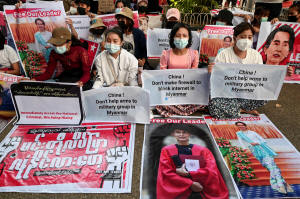Three wounded in Myanmar as hundreds of thousands of protesters defy
junta
 Send a link to a friend
Send a link to a friend
 [February 12, 2021]
(Reuters) - Supporters of ousted
Myanmar leader Aung San Suu Kyi clashed with police on Friday as
hundreds of thousands joined nationwide pro-democracy demonstrations in
defiance of the junta's call to halt mass gatherings. [February 12, 2021]
(Reuters) - Supporters of ousted
Myanmar leader Aung San Suu Kyi clashed with police on Friday as
hundreds of thousands joined nationwide pro-democracy demonstrations in
defiance of the junta's call to halt mass gatherings.
The United Nations human rights office said more than 350 people,
including officials, activists and monks, have been arrested in Myanmar
since the Feb. 1 military coup, including some who face criminal charges
on "dubious grounds".
The U.N. rights investigator for Myanmar told a special session of the
Human Rights Council in Geneva that there were "growing reports,
photographic evidence" that security forces have used live ammunition
against protesters, in violation of international law.
Myint Thu, Myanmar’s ambassador to the U.N. in Geneva, told the session
that Myanmar did not want "to stall the nascent democratic transition in
the country," and would continue international cooperation.

Friday's mostly peaceful protests were the biggest so far, and came a
day after Washington imposed sanctions on generals who led the takeover.
Three people were wounded when police fired rubber bullets to break up a
crowd of tens of thousands in the southeastern city of Mawlamyine, a
Myanmar Red Cross official told Reuters.
Footage broadcast by Radio Free Asia showed police charging at
protesters, grabbing one and smashing him in the head. Stones were then
thrown at police before the shots were fired.
"Three got shot – one woman in the womb, one man on his cheek and one
man on his arm," said Myanmar Red Cross official Kyaw Myint, who
witnessed the clash.
Several people in Mawlamyine were arrested but later released when a
thousands-strong crowd stood outside the police station and demanded
they be freed, according to live footage broadcast by Radio Free Asia.
Doctors have said they do not expect a 19-year-old woman shot during a
protest in the capital Naypyitaw on Tuesday to survive. She was hit in
the head with a live round fired by police, witnesses said.
In the biggest city Yangon on Friday, hundreds of doctors in white duty
coats and scrubs marched past the golden Shwedagon pagoda, the country's
holiest Buddhist site, while in another part of town, football fans
wearing team kits marched with humorous placards denouncing the
military.

Other demonstrations took place in Naypyitaw, the coastal town of Dawei,
and in Myitkyina, the capital of northern Kachin state, where young men
played rap music and staged a dance-off.
Social media giant Facebook said it would cut the visibility of content
run by Myanmar’s military, saying they had "continued to spread
misinformation" after seizing power.
CALL FOR 'MORE ACTIONS'
As Washington announced sanctions, European Union lawmakers called on
Thursday for action from their countries and Britain said it was
considering measures to punish the coup leaders.
[to top of second column]
|

Demonstrators hold signs to protest against the military coup and
demand for the release of elected leader Aung San Suu Kyi, in
Yangon, Myanmar, February 12, 2021. REUTERS/Stringer

Supporters of Suu Kyi's National League for Democracy (NLD) welcomed
the U.S. sanctions but said tougher action was needed.
"We are hoping for more actions than this as we are suffering every
day and night of the military coup here in Myanmar, " Suu Kyi
supporter Moe Thal, 29, told Reuters.
Myint Thu, Myanmar's ambassador to the U.N. in Geneva, told the
special council session that his government wanted "better
understanding of the prevailing situation in the country, and
constructive engagement and cooperation from the international
community."
"We do not want to stall the nascent democratic transition in the
country," he said.
The coup has prompted the biggest demonstrations since a 2007
"Saffron Revolution" that ultimately became a step toward the
democratic change that has now been halted.
Friday's protests marked the seventh consecutive day of protests,
including one on Thursday outside the Chinese embassy where NLD
supporters accused Beijing of backing the junta, something China has
denied.
Security forces carried out more arrests overnight Thursday.

PRISONER AMNESTY
The junta remitted the sentences of more than 23,000 prisoners on
Friday, saying the move was consistent with "establishing a new
democratic state with peace, development and discipline" and would
"please the public".
The Frontier Myanmar news magazine reported the prisoners given
amnesty included four supporters of a gunman who shot dead a
prominent Suu Kyi ally and constitutional lawyer in 2017.
The protests have revived memories of almost half a century of
direct army rule, punctuated by bloody crackdowns, until the
military began relinquishing some power in 2011.
Suu Kyi, who spent nearly 15 years under house arrest under previous
juntas and won the Nobel Peace Prize in 1991 for her democracy
struggle, remains hugely popular despite damage to her international
reputation over the plight of the Rohingya minority.
The generals have promised to stick to the 2008 constitution and
hand over power after elections, but on Friday the junta said it
would "work for the emergence of a constitution that is in alignment
and harmony with the Democratic Federal Union".
No date has yet been set for elections.
(Reporting by Reuters staff; Writing by Matthew Tostevin, Stephen
Coates, Raju Gopalakrishnan and Poppy McPherson; Editing by Lincoln
Feast and Frances Kerry)
[© 2021 Thomson Reuters. All rights
reserved.] Copyright 2021 Reuters. All rights reserved. This material may not be published,
broadcast, rewritten or redistributed.
Thompson Reuters is solely responsible for this content. |